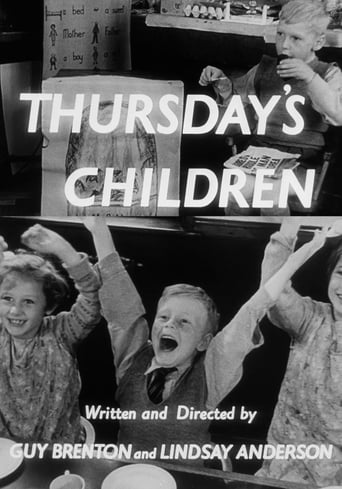Konterr
Brilliant and touching
ChicDragon
It's a mild crowd pleaser for people who are exhausted by blockbusters.
Brendon Jones
It’s fine. It's literally the definition of a fine movie. You’ve seen it before, you know every beat and outcome before the characters even do. Only question is how much escapism you’re looking for.
Billie Morin
This movie feels like it was made purely to piss off people who want good shows
Red-Barracuda
Thursday's Children is maybe best known as an early work from Lindsay Anderson who would go on to critical acclaim as the director of films such as If (1969). In fact, this is really no inconsequential work given the fact that it actually won an Oscar for best short documentary. Narrated by Richard Burton, it focuses on the children from the Royal School for the Deaf in Margate. It considers their situation in life and some of the difficulties that teaching them presents.It's a pretty minimalistic documentary in fairness and is one which is really of fairly selective interest nowadays. For Anderson scholars, it offers another facet of his work and I guess it ties in with some themes he would delve into with If, in its focus on private schools. Except, unlike that movie, the message regarding the school system here is clearly a positive one. It is interesting to see an example of the teaching that was normal back at the time and it does show some of the aspects that appear particularly archaic now, such the a story character who is particularly popular with the children called Little Sambo! Obviously that is something that could never be used now but these were different, more innocent times. On the whole, this is a film of fairly minor interest to be honest but it is valuable enough as a time-capsule piece.
gavin6942
The subject deals with the children at The Royal School for the Deaf in Margate, Kent. The hearing-handicapped children are shown painstakingly learning what words are through exercises and games, practicing lip-reading and finally speech. Richard Burton's calm and sometimes-poetic narration adds to the heartwarming cheerfulness and courage of the children.Pretty much as it sounds, this was how deaf children were taught in Britain in the 1950s. I do appreciate that the film starts with a disclaimer that children are no longer taught this way. I was thinking they were warning me of some bad treatment I was going to see, but there was nothing offensive in the documentary at all.
Balok-2
Nowadays, Lindsay Anderson's short documentary about children at a school for the deaf is probably of more interest for what it reveals about attitudes during the 1950's than for its own sake. The film shows how these children are taught to lip-read and to vocalize, and it is interesting to see how it was done. The two teachers shown in the film clearly love their work and the children, and do their jobs with an almost saintly patience. The children are shown as bright, happy, and enthusiastic -- although we see the occasional failure, we never see how the children react to the inevitable frustration that they must have experienced.For those of us who watch the film nowadays, from a perspective of more than half a century, it is hard not to start wondering about the social attitudes toward the deaf that were current at the time the film was made. For example, no effort is made to teach the children sign language (or at least if there is, we never see any evidence of such an effort), even though they openly admit that the school's teaching methods only succeed with one child in three. And one would hope that nowadays, the teacher would find something other than _Little Black Sambo_ to read to the children.
Kenneth de Lorenzi
Brilliant Oscar-winning documentary about a school for deaf children. One of - the sometimes slightly grumpy - Lindsay Anderson's more altruistic and poetic moments. The film is almost completely silent (with music and narration, though), which gives you a good sense of how these children must perceive the world around them. For years it was almost impossible to find this wonderful little movie other than on 16mm film, but in 2007 the Criterion edition of Anderson's masterpiece 'if....' included 'Thursday's Children' as a bonus. The film is narrated by Richard Burton and was co-directed by Guy Brenton. Anderson shot this simultaneously with another short, the satirical amusement park portrait 'O Dreamland' (1953).

